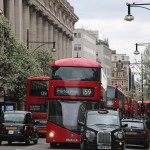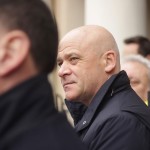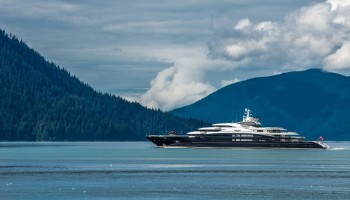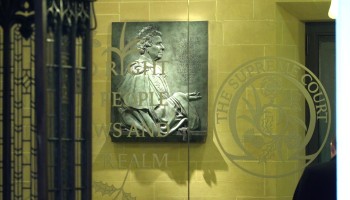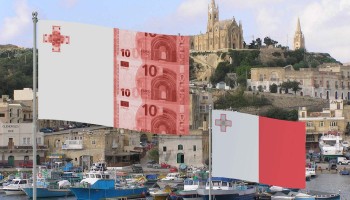Boris and Arkadiy Rotenberg belong to one of Russia’s richest families. As old friends of President Vladimir Putin, the brothers have international business interests and active lives.
So they could easily afford the US$ 100 million-plus they spent on three high-end private jets. But the businessmen also knew a legal way to avoid paying value-added tax (VAT) on them, for an estimated savings of about $20 million.
The brothers registered their planes on the Isle of Man, an island state in the Irish Sea with a population of about 85,000. The Manx people are British citizens, but their tiny state is not a part of the European Union (EU).
Thanks to customs and tax agreements with the United Kingdom (UK), anything imported into the Isle of Man is deemed to have been imported into the UK, and, therefore, into the European economic area. At the same time, the island offers expedited services and a relaxed attitude towards tax shenanigans that are not tolerated in EU states.
Details about the Rotenbergs’ deals and other normally secret transactions were buried in thousands of pages of documents leaked to the Süddeutsche Zeitung newspaper and shared with the International Consortium of Investigative Journalists (ICIJ). ICIJ shared the documents with media outlets around the world, including the Organized Crime and Corruption Reporting Project (OCCRP).
Included in the leak were documents from Appleby, a Bermuda based law firm that specializes in offshore cases and gives legal advice and services to cost-conscious millionaires the world over. Appleby also has offices on the Isle of Man.
As reporters discovered, the firm helped to get more than 50 airplanes worth over $1 billion registered in the Isle of Man.
A tax average people can’t avoid
The VAT is a consumption tax levied in about 160 countries. For example, most UK citizens pay 20 percent VAT on just about everything, except for some medical supplies, cultural services, and things like education. Rates vary in other European countries.
For the past 10 years, the Isle of Man has gone in a different direction. In 2007, the island established the Isle of Man Aircraft Registry, which has grown popular with the world’s wealthy, as it has allowed them to import thousands of planes into Europe without paying any VAT.
Manx authorities say its aircraft registry is now the sixth largest in the world.
How does it work?
The process is not all that simple, which is why law firms like Appleby have found a market for their specialized services.
When a person buys a car, he pays money to the seller, including the VAT; registers it in his name; spends money on gas and services from his own pocket; and possibly pays yearly transport or property taxes to the state.
Logically, buying a private plane should work about the same way. And yet it doesn’t, because the overwhelming majority of high-end private jets are bought in the names of companies, rather than people.
On paper these companies can be set up as air carriers, which frees them from VAT in Europe. They can also be registered as leasing businesses, in which case they must pay VAT but can get refunds. Appleby can arrange these things for its customers.
The Rotenberg Brothers
Since Putin rose to power in Russia, the Rotenbergs have done well, with state funds the main source of their wealth. They appear to have bought themselves one private plane each, plus one for corporate needs.
The process Arkady Rotenberg went through to buy his 16-seater Global XRS is a primer on how to avoid VAT.
In an introductory letter to Appleby, his representatives specified that the plane would be used for the personal needs of the owner and his family, friends, and subordinates.
“Would you be able to assist in connection with the registration and EU import (at VAT friendly conditions) of a new Global XRS in Isle of Man? The aircraft is still in Canada, but ready for delivery,” the letter says.
Staff members at Appleby then suggest a complex corporate scheme, requiring a chain of companies, to avoid VAT. These include:
A company on the British Virgin Islands (BIV) to be the official owner of the plane. This company opens a subsidiary on the Isle of Man.
The subsidiary is registered as a taxpayer on the island, and officially imports the plane into the Eurozone. But on paper, the end user is a third company in Cyprus.
The company in Cyprus leases the plane.
In this way, the plane officially becomes an asset of the leasing business. The owner of the leasing company has the right to be reimbursed for VAT levied on the plane.
Boris Rotenberg used the identical scheme to import a Bombardier Global 5000. With a wingspan of 29 meters, this long-haul plane can fly even from short runways and land in mountain airports.
The pattern varies in other cases in the leaked documents, with jurisdictions of the owner and the lease changing from the British Virgin Islands (BVI) to Bermuda, or Cyprus to the BVI. The crucial part is to establish a VAT registered business on Isle of Man.
Among Appleby`s clients there are many high net-worth individuals and Forbes’ richest men from many countries, including Formula 1 driver Lewis Hamilton, Israeli businessman Idan Ofer, and Lebanese banker and politician Adnan Kassar.
Lawyers and staff members of the Russian Tax Service, who spoke to OCCRP on condition of anonymity said they are familiar with such schemes and don't consider them illegal. One said, “This is optimization more than a scheme of evasion.”
Aleksandr Orlov, managing partner of the consulting company Orlov and Sizov, said that registering private property in a company’s name “is common practice. It’s common enough that, up to this time, no one has dared to call it illegal. Formally, the company is respecting legislation, and not violating the law.”
He did say, however, that such relaxed official attitudes appear to be changing.
“Lately the tax services have started to pay more attention to the content of business activity,” he said. “If the actual work of a company does not correspond to its declared goals, they don’t recognize the tax expenses. That means problems for holding structures that only pretend to conduct business activity.”
The Magic Isle
The Isle of Man’s VAT legislation is generally the same as in other European countries and in Russia: businesses do not pay VAT on their assets. But Manx lawyers have another selling point: speedy processing of applications and an apparent lack of auditing requirements.
On the Isle of Man, VAT refunds take one day. The airplane owner doesn’t have to spend a penny -- on paper the tax is paid and refunded immediately.
An attorney who specializes in guiding clients through the process and who requested anonymity said, “This is a bit of magic that can be accomplished on the Isle of Man if the necessary structure is set up and a local corporate service company is hired. In England, for example, this approach would not work.”
In Russia, VAT refunds can take months, and that is if everything goes smoothly.
“The tax services are reluctant to approve the refunds,” says Orlov. “Most of the time you have to prove your claim in court. A tax audit may raise serious questions about the whole business structure. The procedure is similar in other European countries.”
The lawyer says everyone knows what’s happening on the Isle of Man.
“Yes, Isle of Man government officials are aware of the use of this structure, and allow it, because they find it expedient to attract aircraft to be registered on the Isle of Man. In this way, the Isle of Man is a typical tax haven jurisdiction that attracts transactions and capital by not taxing them. The parties who have an interest in complaining about tax havens are countries that are losing transactions and capital that they would like to tax. Yet, so far, the EU has not challenged the Isle of Man mechanism of avoiding paying EU VAT while also offering EU-VAT-tax-paid-status to aircraft registered on the Isle of Man.”
It cost Arkady Rotenburg a bit less than £13,500 to import his Global XRS, plus an annual payment of about £4,000 to maintain the corporate structure. Still, he saved over $8 million in VAT charges.
Also, the Isle of Man has no asset or company income tax. A person registering a private jet in Russia under his or her own name, or in the name of their company, would have to pay an annual asset tax on the aircraft.
Hundreds of millions in lost taxes
Assuming that all 50 airplanes OCCRP reporters found in the Appleby documents were actually private planes, the lost VAT in the UK would come to over $200 million.
Still, this is a rough estimate. “If the plane is actually used for corporate needs – say to take a top manager from one business venue to another or for business trips – the company indeed has a right to refund VAT,” notes Orlov.
It isn’t always clear from Appleby’s correspondence with its clients whether the planes are meant for private or corporate usage. But sometimes, owners register their aircraft in the names of family members.
For example, Russian businessman Oleg Deripaska registered his plane in the name of his mother Valentina, while a plane belonging to Alexander Skorobogatko and Alexander Ponomarenko is formally owned by their wives and children.
As for the leasing maneuver, the Appleby records indicate that some plane owners didn’t bother to make lease payments -- sometimes for years -- despite Appleby warning them that they needed to do so every quarter to qualify for a VAT refund. The documents contain no evidence that Isle of Man authorities ever questioned such lapses.
Not only taxes
Experts interviewed by OCCRP noted that a favorable tax climate isn’t the only reason Russian clients like to register their planes on the Isle of Man.
Sergey Shvalya, of Russia’s Aircraft Owners and Pilots Association (AOPA), says tax regulation makes Russia a bad place to register a plane. “Russia virtually doesn’t have a system of airworthiness control – no proper legislation, no technical regulations, [and] no inspection," he says. “Right after being registered in Russia, an airplane loses 30 percent of its value. No one trusts Russia’s control system.”
“If you’re buying a jet with borrowed funds, the bank will demand it be registered in Europe,” Shvalya continued. “Even when one buys with his own money,” one has to consider the immediate loss in value. “Rich people don’t like flying old planes, usually they don’t keep them for more than six years, or even less – three to four years.”
Registering a plane in the West makes it “way easier to actually use the plane, maintain it, [and] renew ratings in your pilot’s license,” he says. “Nobody wants to follow the horrific rules invented by our lawmakers.”
Still for big businessmen, the tax advantages are paramount.
Aviation Legal Group attorney Derek Bloom of Fort Lauderdale, Florida, who for many years worked in Moscow, says some clients have told him “they would strongly prefer to register their aircraft in Russia.” But like most Russians, he says, they “consider paying taxes unnecessarily to be a waste of money, if the taxes may be avoided legally.”
He said the Russian government should “create an exemption from import VAT for aircraft imported and registered in Russia. Then, there would be fair competition between the Russian aircraft registry and European aircraft registries, and a business case for a growing private jet industry in Russia,” instead of losing revenue and business to tax havens.
And in fact, the Ministry of Trade and Industry recently proposed introducing tax advantages to private jet owners who register their planes in Russia, including a zero VAT rate.
Isle of Man authorities deny any wrongdoing. A spokesperson told an ICIJ reporter, “No jurisdiction in the world could ever guarantee that instances of evasion, abusive tax avoidance, and error do not occur on an individual basis, [and] the Isle of Man is committed to ensuring that it is not used by those seeking to evade taxes or to abusively avoid taxes.”
Howard Quayle, chief minister of the Isle of Man, said the island government has invited British treasury officials to assess Manx practices regarding aircraft imports.
Arkadiy Rotenberg
Bombardier Global XRSM-ARRJPrice:$ 43 935 000Arkadiy Rotenberg is a Russian businessman whose personal wealth is estimated by Forbes to be $2.6 billion. Rotenberg is a childhood friend and judo sparring partner of Russian President Vladimir Putin.
In its 2016 “Kings of State Contracts” rating, the Russian edition of Forbes places Rotenberg in first place, with more than half a trillion rubles ($7.4 billion) in state contracts. Many if not most of the contracts awarded to Rotenberg companies did not go through a competitive tender process.
Rotenberg bought his Global XRS jet in 2011. In February, 2012 it was imported to the Isle of Man with the assistance of the Appleby law firm. Bombardier’s Global XRS is an ultra-long-range business jet that can fly intercontinental ranges without refueling.
The buyer's representatives noted in their letters to Appleby that the jet would be used privately.
According to Appleby's 2012 aircraft usage data, the jet frequently flew from Moscow to St. Petersburg, Nice, Phuket, Dubai and Papua in Indonesia.
On several occasions in August 2012, the jet traveled to Pau, a small city near Biarritz, France, which is beloved by Putin’s Russian family. OCCRP earlier reported that Putin’s ex-wife and a woman believed to be his daughter own villas in Biarritz.
These flights appear to be to leisure destinations, and as such would be subject to VAT. According to OCCRP’s evaluation, based on the aircraft’s travel logs, about 40 percent of its flights are of this nature.
Boris Rotenberg
Bombardier Global 5000M-BRRBPrice:$ 36 986 000Boris Rotenberg is Arkadiy Rotenberg’s younger brother. Forbes estimates his fortune at $1 billion.
He acquired his jet, which is similar to the Global XRS, in 2013, using a loan from Credit Suisse.
The aircraft was imported to the Isle of Man in May 2013 under the leasing scheme described above. But no leasing fees were paid until at least January 2014, according to the Appleby data. This means that the owner of the aircraft should have paid the whole VAT amount, which did not happen.
Oleg Deripaska
Gulfstream G550M-SAWOPrice:$ 29 000 000Deripaska, an aluminum mogul, chose a Gulfstream-550 for his flights. The manufacturer advertises this model as the best-in-value business jet. It can transport up to 19 passengers.
Officially the aircraft was bought in 2004 by a company belonging to Valentina Deripaska, the businessman’s mother. The jet purchase was partly financed by a loan from Credit Suisse.
Deripaska registered the aircraft in Bermuda, though it has mainly been operated in Russia. In 2013, Raiffeisen refinanced Credit Suisse’s loan. The new bank requested a change in the country of registration, and in 2013 Deripaska’s representatives asked Appleby to help import the jet from Bermuda to the Isle of Man.
Deripaska’s representatives emphasized that a main concern was to pay zero VAT. Appleby lawyers offered to establish a leasing structure to accomplish for this purpose, but Deripaska did not follow the protocol. After his jet was imported, his representatives stopped answering Appleby's letters. No leasing fees were paid until at least 2015, meaning Deripaska’s company had no right to a VAT refund.
Aleksandr Ponomarenko and Aleksandr Skorobogatko
Gulfstream G550M-ATPSPrice:$ 44 557 134Aleksandr Ponomarenko and Aleksandr Skorobogatko started a business together in Crimea in the 1990s, and afterwards moved to Moscow together. Today they are involved in banking and real estate. Aleksandr Ponomarenko became famous in 2010, when he bought a luxurious palazzo near Gelendzhik widely known as “Putin’s Palace.”
Aleksandr Skorobogatko was a member of the Rusisan parliament from 2003 until 2016. Two months after the latest elections, he stepped down from office to return to business.
Ponomarenko and Skorobogatko bought the plane in 2011. It belongs to a joint family trust.
